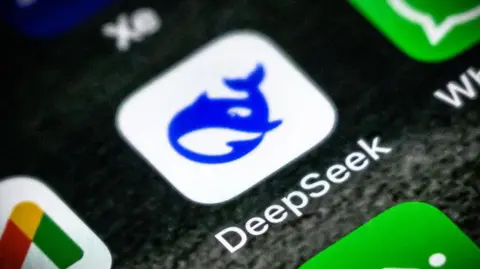**Australia’s Restrictions on DeepSeek: A Security Concern**
Australia has recently moved to ban DeepSeek from all government devices and systems due to significant concerns regarding the security risks associated with the Chinese artificial intelligence (AI) startup. This decision stems from apprehensions about the potential threats the technology could pose to national security, especially given the company’s emergence in the global market.
In January, DeepSeek astonished the tech industry by releasing a chatbot that purportedly rivaled those developed by American companies, while simultaneously claiming a markedly lower training cost. This announcement had far-reaching consequences, resulting in billions of dollars in losses across global stock markets. Specifically, Australian companies linked to AI technologies, including the chipmaker Brainchip, witnessed a rapid decline in their stock prices following the news.
Despite the clear linkage to DeepSeek’s Chinese origins, the Australian government has publicly stated that the ban is grounded not in xenophobia, but rather in the “unacceptable risk” to national security that the application presents. This decision underlines Australia’s commitment to safeguarding its governmental operations from foreign entities perceived as potential threats.
In an official directive, the Australian government mandated that all government entities must prevent the use or installation of DeepSeek products, applications, and web services. Additionally, any previously installed DeepSeek services are to be removed from government systems or devices. This prohibition extends to a wide range of users, including employees from various government branches such as the Australian Electoral Commission and the Bureau of Meteorology.
However, the specifics of the ban’s application remain somewhat ambiguous, particularly regarding its implications for public sector computers in educational institutions and other areas of the economy. Importantly, the ban does not extend to private citizens’ devices, indicating a focused approach on governmental security rather than an outright rejection of DeepSeek’s technology in civilian life.
**Growing Concerns About Chinese Technology**
Australia’s actions reflect a broader trend among Western nations that harbor skepticism towards Chinese tech firms, notably examples such as Huawei and the popular social media platform, TikTok, both of which have faced restrictions on national security grounds. In contrast to the initial global enthusiasm surrounding DeepSeek—evidenced by its rapid growth to become the most downloaded free app in both the UK and US—concerns are now surfacing regarding its implications for privacy and data security.
This cautious attitude was echoed by former President Donald Trump, who described DeepSeek’s emergence as a “wake-up call” for the United States, although he noted that it might present a beneficial opportunity if it leads to reduced AI costs. However, Australian officials have underscored the importance of exercising caution with DeepSeek due to potential data and privacy issues. The growing scrutiny of the platform reflects a significant hesitance among global regulators; for instance, the Italian government previously blocked ChatGPT due to privacy concerns, and DeepSeek was recently removed from app stores in Italy following similar evaluations.
Regulatory bodies in countries such as South Korea, Ireland, and France are currently investigating how DeepSeek processes and safeguards user data, particularly given that user information is stored on servers based in China. The White House has also initiated inquiries into possible security ramifications linked to the application. Meanwhile, reports have emerged suggesting that the US Navy has effectively barred its personnel from utilizing DeepSeek—a move that underscores the increasing trepidation regarding this AI technology.
**Information Handling and AI Risks**
The scrutiny surrounding DeepSeek is not solely attributed to its origins but also revolves around the type of data it collects. Typically, AI tools analyze user prompts for product improvement, and this is true for DeepSeek, as well as competitors like ChatGPT and Google Gemini. All these platforms do retain a range of user information, including personal identifiers such as emails and dates of birth.
Experts argue that those immersed in sensitive national security roles should remain acutely aware of the risks associated with disclosing information to AI-driven platforms that may exploit or analyze user deployments. Additionally, DeepSeek has encountered allegations of improperly leveraging American technology to enhance its products, further complicating perceptions of its ethical implications in the competitive AI landscape confronted by organizations such as OpenAI, which has voiced concerns regarding competitors’ utilization of its technology.
In conclusion, the Australian government’s ban on DeepSeek encapsulates a broader narrative of security and privacy concerns that continue to shape the discourse surrounding foreign technology companies, particularly those with ties to nations that are perceived as geopolitical rivals. The implications of these developments will likely reverberate not only across Australia but throughout the international tech ecosystem.



